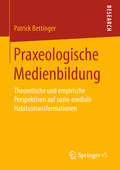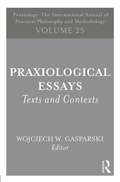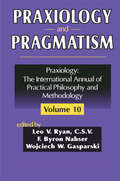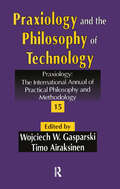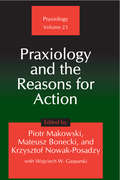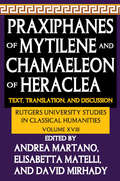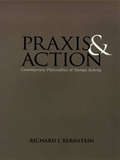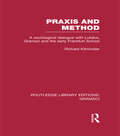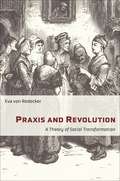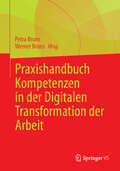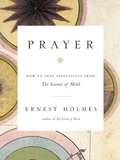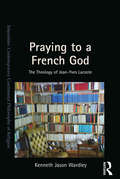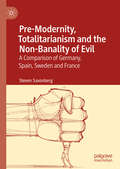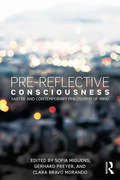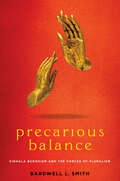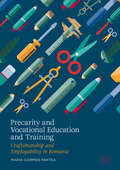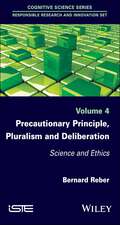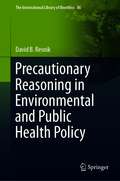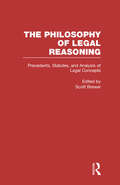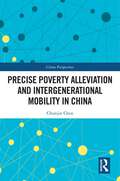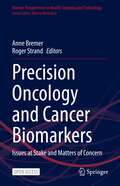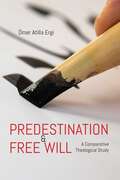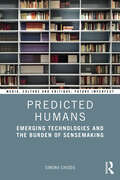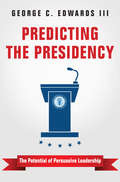- Table View
- List View
Praxeologische Medienbildung: Theoretische und empirische Perspektiven auf sozio-mediale Habitustransformationen
by Patrick BettingerIn diesem Buch werden Aspekte einer praxeologisch ausgerichteten und empirisch fundierten Medienbildungstheorie skizziert, die das Zusammenspiel von Menschen und medialen Artefakten in Bildungsprozessen eingehend beleuchten. Medienbildung wird hierbei als ein Transformationsprozess verstanden, der sich durch das Wechselverhältnis von personalem Habitus und ‚Quasi-Habitus’ medialer Artefakte auszeichnet. Anhand einer fallübergreifenden Perspektive auf Grundlage der dokumentarischen Analyse biografisch-narrativer Interviews sowie medialer Artefakte werden drei Varianten sozio-medialer Habituskonfigurationen identifiziert, die Bildungsprozesse in jeweils spezifischer Weise prägen.
Praxiological Essays: Texts and Contexts (Praxiology)
by Wojciech W. GasparskiThe 25th volume in the series Praxiology: The International Annual of Practical Philosophy and Methodology brings a praxiological perspective to current issues facing our society. In sixteen brand-new essays, a team of international scholars expands praxiology beyond the borders of its historically philosophical application and uses it to address real-world problems in a variety of fields. The volume outlines new approaches and reflections on traditional praxiological method, and then applies these developments as tools in fields as diverse as ethics, psychology, sociology, economics, management, and entrepreneurship. Grounded in the tradition of the Polish praxiologist Tadeusz Kotarbiński (1886-1981), the 25th volume, entitled Praxiological Essays: Texts and Contexts, highlights the rich mosaic of issues perceived in the practice of human action, and carries a tradition of Praxiological inquiry forward into our contemporary philosophy, methodology, and social sciences.
Praxiology and Pragmatism
by F. NahserVolume l0 in this distinguished series addresses two distinct but interrelated philosophical movements, which exemplify different approaches to the study of ethics. Praxiology, an unique Central European philosophical movement, embraces the study of purposeful and conscious action and the elements essential to each action, act, and causative act. Pragmatism, an uniquely American philosophical movement, was founded by Charles S. Peirce and William James, and is based on the meaning of conceptions, defined in their practical bearings that guides actions and measures them by practical consequences of belief. The chapters in this volume are grouped in a section on Praxiology and one on Pragmatism. Each section defines the historical origins of their respective philosophical movements, describes their methodology, and interrelates their impact on "human conduct" and contemporary society. The section on Praxiology presents for the first time in English a seminal study, "The ABC of Practicality," written in l972 by Tadeusz Kotarbinski, the father of modern Polish praxiology. Wojciech W. Gasparski offers an interpretative analysis of Praxiology. Daryl Koehn explores the nature of practical judgment and Timo Airaksinen applies praxiological efficiency in professional ethics. The section devoted directly to Pragmatism includes scholarly contributions by eight academics on the relevance of pragmatism to management (Juan Fontrodona), business ethics (Sandra Rosenthal), law ( Fred Kellogg), and pragmatic inquiry (F. Byron Nahser). The contribution of Max Scheler to pragmatism (Manfred Frings) and the influence of William James on business ethics(Dennis McCann) are groundbreaking contributions to the study of pragmatism. The volume also includes a teaching model for a classroom application of pragmatism (Jack Ruhe), and concludes with an evaluation of the renaissance of interest in pragmatism in Europe (Jacek Sojka). Leo V. Ryan, C.S.V., professor of management, DePaul University, is past president of the Society for Business Ethics. He is co-editor of Human Action in Business (Vol. 5) and Business Students Focus on Ethics (Vol. 8) of the Praxiology series. F. Byron Nahser is chairman and CEO, Globe Group, Chicago, the originator of Pathfinder Pragmatic Inquiry Method and author of Learning to Read the Signs: Reclaiming Pragmatism in Business. Wojciech W. Gasparski is professor of humanities at the Institute of Philosophy and Sociology, the Polish Academy of Sciences, Warsaw, and editor-in-chief of the Praxiological series. He has published numerous volumes and over two hundred articles and conference papers.
Praxiology and the Philosophy of Technology (Praxiology Ser.)
by Wojciech W. Gasparski Timo AiraksinenTechnology is a crucial feature of the modern world, and human beings are necessarily technological creatures. Our goal must be to use technology effectively, efficiently, and ethically. We have hands that are adept at using tools, and intelligence that guides our actions. We also have desires and emotions that motivate us to achieve more and more, never allowing us to stop.From the viewpoint of praxiology, technology does not exist merely to satisfy the human need in an effective and efficient way. The problems of the modern world and the questions we must ask with respect to technology and how it is used are complicated and demanding. They may initially seem mysterious, perhaps even partly subconscious. In this fifteenth volume of a distinguished international series, contributors address essential questions about the philosophy and ethics of technology. Their intention is to point out the road not only to its better applications but also to its greater understanding.The first part of the book addresses general questions about the theory of technology. The second part of the volume focuses on special topics like information and communication technologies and work systems, as well as the foundations of problem solving and the history of innovation in the age of enlightenment. The third part of the book is on ethical judgments. It emphasizes the importance of ethics in the application of technology and, especially, when we commercialize it in order to meet the needs of the people in a free market society. This volume offers its reader a balanced picture of the state of the art of theoretical and applied issues in technology research--emphasizing the praxiological perspective that characterizes the entire series.
Praxiology and the Reasons for Action (Praxiology Ser.)
by Piotr MakowskiThis volume explores two traditions in practical philosophy: action theory, which concerns the nature of motivation for human action, and praxiology, the study of human action. By bringing different perspectives together, the volume strives to contribute to the international debate on theories of reasons for action as a philosophy of action.The volume consists of three main parts. The first part, "Reasons for Action," bridges the gap between reasons for action theories and praxiology. The second part of the volume, titled "Theories of Action," explores philosophical approaches to action. Finally, in the third part, "Applications," the contributors show several ways of applying praxiological ways of thinking and acting to the problems of reflection assessment, solving action incompleteness, and knowledge management.The ultimate goal of this volume is to broaden the scientific view of action: to establish a perspective on action that is permeated by moral theories on the one hand, and accounts focused on efficiency and economy of action on the other hand. This work is the newest volume in Transaction's Praxiology series.
Praxiphanes of Mytilene and Chamaeleon of Heraclea: Text, Translation, and Discussion (Rutgers University Studies In Classical Humanities Ser.)
by David Mirhady Andrea Martano Elisabetta MatelliThis installment of the distinguished RUSCH series focuses on two Peripatetic philosophers of the fourth and third centuries BCE: namely, Chamaeleon and Praxiphanes, both of whom were associated with Theophrastus, Aristotle's successor as head of the Peripatetic School. Chamaeleon and Praxiphanes were intellectuals active in the political and civic life of the Hellenistic Period. Their scholarly interests included inter alia ethics, biography, textual criticism, and linguistics. The work presents new editions of the ancient source texts for Chamaeleon and Praxiphanes. Each is accompanied by an apparatus of textual variants and a second apparatus of parallel texts. In addition, there is a facing translation in English as well as notes to the translation. There follow ten essays that clarify material presented in the text translation. The volume closes with an index listing the ancient sources that are referred to the preceding essays. This volume continues over thirty years of tradition in the RUSCH series, edited by William W. Fortenbaugh, the finest series available in Aristotelian studies.
Praxis and Action
by Richard J. BernsteinFrom the Introduction:This inquiry is concerned with the themes of praxis and action in four philosophic movements: Marxism, existentialism, pragmatism, and analytic philosophy. It is rare that these four movements are considered in a single inquiry, for there are profound differences of emphasis, focus, terminology, and approach represented by these styles of thought. Many philosophers believe that similarities among these movements are superficial and that a close examination of them will reveal only hopelessly unbridgeable cleavages. While respecting the genuine fundamental differences of these movements, this inquiry is undertaken in the spirit of showing that there are important common themes and motifs in what first appears to be a chaotic babble of voices. I intend to show that the concern with man as an agent has been a primary focal point of each of these movements and further that each contributes something permanent and important to our understanding of the nature and context of human activity.
Praxis and Method (RLE (RLE (RLE (RLE (RLE (RLE (RLE (RLE: Gramsci): A Sociological Dialogue with Lukacs, Gramsci and the Early Frankfurt School
by Richard KilminsterThis sociological critique of the ‘philosophy of praxis’ looks at the importance of the concept in the social theory of leading influential Western Marxists such as Lukács, Gramsci, Korsch, Horkheimer, Marcuse and Adorno in the inter-war period. It offers a detailed critique of Marx and Hegel, and explores the validity and implications for sociology of two of Marx’s ideas which the later theorists made the centre piece of their social theory: first, that true theory is authenticated by praxis, and second, its corollary that certain major social transformations should and would in practice render sociology redundant.
Praxis and Revolution: A Theory of Social Transformation (New Directions in Critical Theory #71)
by Eva von RedeckerThe concept of revolution marks the ultimate horizon of modern politics. It is instantiated by sites of both hope and horror. Within progressive thought, “revolution” often perpetuates entrenched philosophical problems: a teleological philosophy of history, economic reductionism, and normative paternalism. At a time of resurgent uprisings, how can revolution be reconceptualized to grasp the dynamics of social transformation and disentangle revolutionary practice from authoritarian usurpation?Eva von Redecker reconsiders critical theory’s understanding of radical change in order to offer a bold new account of how revolution occurs. She argues that revolutions are not singular events but extended processes: beginning from the interstices of society, they succeed by gradually rearticulating social structures toward a new paradigm. Developing a theoretical account of social transformation, Praxis and Revolution incorporates a wide range of insights, from the Frankfurt School to queer theory and intersectionality. Its revised materialism furnishes prefigurative politics with their social conditions and performative critique with its collective force.Von Redecker revisits the French Revolution to show how change arises from struggle in everyday social practice. She illustrates the argument through rich literary examples—a ménage à trois inside a prison, a radical knitting circle, a queer affinity group, and petitioners pleading with the executioner—that forge a feminist, open-ended model of revolution.Praxis and Revolution urges readers not only to understand revolutions differently but also to situate them elsewhere: in collective contexts that aim to storm manifold Bastilles—but from within.
Praxishandbuch Kompetenzen in der Digitalen Transformation der Arbeit
by Petra Bruns Werner BrunsDas Praxishandbuch arbeitet die Kompetenzen für zukünftiges Arbeiten im Kontext der Digitalen Transformation heraus und soll Staat, Unternehmen und Zivilgesellschaft als Entscheidungshilfe in den Bereichen Strategie-, Personal- und Innovationmanagement dienen.Mensch und Technik waren sich durch die Digitalisierung noch nie so nah wie heute. Diese Nähe verändert Mensch, Unternehmen, Arbeit und Leben. Solche Veränderungen muss man verstehen, um mitzuhalten. Denn nur das, was wir verstehen, können wir auch aktiv und kreativ im Arbeitsalltag umsetzen und gestalten. Staat, Unternehmen und auch die Zivilgesellschaft müssen sich zukünftig noch stärker in ihren Entscheidungen darauf einstellen.Wichtige Kompetenzfelder sind heute die sozialen Prozesse im Zuge der beschleunigten Digitalen Transformation von Wirtschaft, Gesellschaft und Politik. Analysieren, Einordnen, Denken, Handeln und Evaluieren. Technologie, Talente, Toleranz und Tradition zusammen denken. Änderungen im Unternehmen vorschlagen, die sinnvoll sind und das mit Leidenschaft tun.
Prayer: How to Pray Effectively from the Science of Mind
by Ernest HolmesCombining the most essential principles about prayer with the dozens of prayers and meditations from Ernest Holmes's classic text, The Science of Mind, this new book, Prayer, is a simple introduction for anyone who wants to learn how to pray effectively. "What does one do when he prays?" writes Holmes. "He talks to God. Where does he talk to God? He talks to God in his own mind, through his own thought or feeling. " .
Praying to a French God: The Theology of Jean-Yves Lacoste (Intensities: Contemporary Continental Philosophy of Religion)
by Kenneth Jason WardleyAs a phenomenologist Lacoste is concerned with investigating the human aptitude for experience; as a theologian Lacoste is interested in humanity’s potential for a relationship with the divine, what he terms the ’liturgical relationship’. Beginning from the proposition that prayer is a theme that occurs throughout Lacoste’s writing, and using this proposition as a heuristic through which to view, interpret and critique his thought, this book examines Lacoste’s place amid both the recent ’theological turn’ in French thought and the post-war emergence of la nouvelle théologie. Drawing upon unpublished and out of print material previously only available in French, Romanian or German, the book will be of interest to scholars of philosophy, phenomenology and theology.
Pre Ged® Test Preparation Reasoning Mathematical Reasoning (Steck-vaughn Pre-ged Ser.)
by Steck-Vaughn CompanyFocuses on the three major skill sets that appear on the GED Reasoning through language arts test: Reading comprehension, Writing on extended response, Language conventions and usage.
Pre-Modernity, Totalitarianism and the Non-Banality of Evil: A Comparison of Germany, Spain, Sweden and France
by Steven SaxonbergThis book provides a comparative and historical analysis of totalitarianism and considers why Spain became totalitarian during its inquisition but not France; and why Germany became totalitarian during the previous century, but not Sweden. The author pushes the concept of totalitarianism back into the pre-modern period and challenges Hannah Arendt’s notion of the banality of evil. Instead, he presents an alternative framework that can explain why some states become totalitarian and why they induce people to commit evil acts.
Pre-reflective Consciousness: Sartre and Contemporary Philosophy of Mind
by Gerhard Preyer Sofia Miguens Clara Bravo MorandoPre-reflective Consciousness: Sartre and Contemporary Philosophy of Mind delves into the relationship between the current analytical debates on consciousness and the debates that took place within continental philosophy in the twentieth century and in particular around the time of Sartre and within his seminal works. Examining the return of the problem of subjectivity in philosophy of mind and the idea that phenomenal consciousness could not be reduced to functional or cognitive properties, this volume includes twenty-two unique contributions from leading scholars in the field. Asking questions such as: Why we should think that self-consciousness is non-reflective? Is subjectivity first-personal? Does consciousness necessitate self-awareness? Do we need pre-reflective self-consciousness? Are ego-disorders in psychosis a dysfunction of pre-reflective self-awareness? How does the Cartesian duality between body and mind fit into Sartre’s conceptions of consciousness?
Precarious Balance: Sinhala Buddhism and the Forces of Pluralism (Studies in Religion and Culture)
by Bardwell L. SmithSince the third century BCE, when the king of Sri Lanka converted to Buddhism, the island nation off the southern coast of India has represented a central interest of Buddhist scholarship. The association between its politics and religious life has not always remained harmonious, however, and has contributed to the contemporary turmoil that threatens to tear it apart. In this valuable book, renowned religious scholar Bardwell Smith elucidates the history of Buddhism in Sri Lanka from the time of one of its earliest rulers through to its present-day strife.The essays collected here for the first time explore various themes of Sri Lanka’s long history in novel and constructive ways. Topics include Sinhala Buddhists’ sense of manifest destiny arising from Sri Lanka’s oldest historical chronicles, the Mahavamsa and the Dipavamsa; the nationalist implications of the chronicles’ depiction of the third-century Mahavihara monastery as the site of "original Buddhism"; and concepts of order and legitimation of power in ancient Ceylon. With a new introduction and final chapter, Smith sheds fresh light on today’s Sri Lanka, connecting historical studies with contemporary issues.
Precarity and Vocational Education and Training: Craftsmanship and Employability in Romania
by Maria-Carmen PanteaThis book explores how the changing nature of work intersects with and influences young people’s views on their future. As an increasingly precarious service sector overtakes traditional industrial work, vocational education and training (VET) is held up as a panacea for poverty alleviation, youth unemployment and economic growth. However, the views of young people in VET themselves concerning their own work and aspirations have largely been ignored. Based on interviews and focus groups conducted with over 250 young people in VET in Romania, this book examines the types of subjectivities that are generated in the processes by which they try to make sense of future and the meanings of work. In doing so, the author identifies three ideological layers that frame their views: arguing that while the young people interviewed hold ‘conventional’ aspirations for stability and predictability; they were visibly influenced by neoliberal beliefs in agency, experimentation and short termism. Ultimately, a layer of low expectations crystallises unvoiced concerns over a troubling future. In highlighting young people’s voices, this pioneering book calls for a recalibration of the emphasis on VET in Romania. It will appeal to students and scholars of youth studies, the sociology of work, vocational education and training and European studies.
Precautionary Principle, Pluralism and Deliberation: Science and Ethics
by Bernard ReberThis volume tackles the burden of judgment and the challenges of ethical disagreements, organizes the cohabitation of scientific and ethical argumentations in such a way they find their appropriate place in the political decision. It imagines several forms of agreements and open ways of conflicts resolution very different compared with ones of the majority of political philosophers and political scientists that are macro-social and general. It offers an original contribution to a scrutinized interpretation of the precautionary principle, as structuring the decision in interdisciplinary contexts, to make sure to arrive this time to the "Best of the Worlds".
Precautionary Reasoning in Environmental and Public Health Policy (The International Library of Bioethics #86)
by David B. ResnikThis book fills a gap in the literature on the Precautionary Principle by placing the principle within the wider context of precautionary reasoning and uses philosophical arguments and case studies to demonstrate when it does—and does not—apply. The book invites the reader to take a step back from the controversy surrounding the Precautionary Principle and consider the overarching rationales for responding to threats to the environment or public health. It provides practical guidance and probing insight for the intended audience, including scholars, students, journalists, and policymakers.
Precedents, Statutes, and Analysis of Legal Concepts: Interpretation (Philosophy of Legal Reasoning: A Collection of Essays by Philosophers and Legal Scholars #2)
by Scott BrewerAt least since plato and Aristotle, thinkers have pondered the relationship between philosophical arguments and the "sophistical" arguments offered by the Sophists -- who were the first professional lawyers. Judges wield substantial political power, and the justifications they offer for their decisions are a vital means by which citizens can assess the legitimacy of how that power is exercised. However, to evaluate judicial justifications requires close attention to the method of reasoning behind decisions. This new collection illuminates and explains the political and moral importance in justifying the exercise of judicial power.
Precise Poverty Alleviation and Intergenerational Mobility in China (China Perspectives)
by Chunjin ChenThe widening of income and wealth inequality has become one of the most important obstacles on the road to China’s common prosperity. In the context of inequality reduction and anti-poverty strategy in China, this book investigates the complex relationship between education and intergenerational mobility in terms of occupation and income. Based on large-scale social survey data, cutting-edge econometric models and statistical methods, the book examines the role of education in breaking the intergenerational transmission of poverty and promoting intergenerational mobility. It analyzes the characteristics of birth cohorts in intergenerational mobility, the long-term trends of educational, occupational, and income mobility among rural and urban residents across generations, and also the different regional patterns of intergenerational mobility against the background of social changes in China. Based on empirical findings, the author advances suggestions on an education policy conducive to poverty alleviation. The book will appeal to scholars and students studying the sociology of education, the economics of education and Chinese education, as well as policy makers interested in the topics of education policy systems and poverty alleviation, as well as education equity and social mobility.
Precision Oncology and Cancer Biomarkers: Issues at Stake and Matters of Concern (Human Perspectives in Health Sciences and Technology #5)
by Roger Strand Anne BremerThis open access book reflects on matters of social and ethical concern raised in the daily practices of those working in and around precision oncology. Each chapter addresses the experiences, concerns and issues at stake for people who work in settings where precision oncology is practiced, enacted, imagined or discussed. It subsequently discusses and analyses bioethical dilemmas, scientific challenges and economic trade-offs, the need for new policies, further technological innovation, social work, as well as phenomenological research. This volume takes a broad actor-centred perspective as, whenever cancer is present, the range of actors with issues at stake appears almost unlimited. This perspective and approach opens up the possibility for further in-depth and diverse questions, posed by the actors themselves, such as: How are cancer researchers navigating biological uncertainties? How do clinicians and policy-makers address ethical dilemmas around prioritisation of care? What are the patients’ experiences with, and hopes for, precision oncology? How do policy-makers and entrepreneurs envisage precision oncology? These questions are of great interest to a broad audience, including cancer researchers, oncologists, policy-makers, medical ethicists and philosophers, social scientists, patients and health economists.
Predestination and Free Will: A Comparative Theological Study
by Omer Atilla ErgiThe concepts of predestination and free will have been and continue to be two of the most difficult problems of classical and contemporary theology and philosophy. The debate on the perplexing coexistence of predestination and free will has been the focal point of discourse among theologians and philosophers since antiquity. The deliberations on determinism also played an important role in the formation of Islamic theology, as the creedal statements of Islamic doctrines define belief in predestination as one of the essential articles of creed while asserting that human agents possess some form of will defined as irada al juz'iyya, &‘the minor will' in the Arabic lexicon. Evidently, the creed of mainstream Islam necessitates that the two concepts are reconciled or at least a conceivable argument is provided to support the notion that predestination could indeed coexist with free will. Arguments for coexistence constructed on scriptural revelation and Prophetic tradition were proposed by various Muslim theologians from the formative period to contemporary times, during which several theological schools emerged due to a number of significant differences in views. This book is primarily based on an examination and analysis of the theological arguments proposed by mainstream Islamic theologians and Fethullah Gülen, a contemporary Muslim scholar, and his theoretical framework on the reconciliation of predestination and free will. The methodology of this project includes comparative and detailed analysis of arguments put forward by formative, classical and contemporary Islamic scholars and examination of arguments proposed by Western theologians and philosophers with an objective to establish the similarities and differences in the theoretical frameworks of scholars from different schools, traditions, and faiths. The main argument of this book is based on the theological premises proposed by Fethullah Gülen and mainstream Sunni theologians that support the coexistence of predestination and free will.
Predicted Humans: Emerging Technologies and the Burden of Sensemaking (Media, Culture and Critique: Future Imperfect)
by Simona ChiodoPredicting our future as individuals is central to the role of much emerging technology, from hiring algorithms that predict our professional success (or failure) to biomarkers that predict how long (or short) our healthy (or unhealthy) life will be. Yet, much in Western culture, from scripture to mythology to philosophy, suggests that knowing one’s future may not be in the subject’s best interests and might even lead to disaster. If predicting our future as individuals can be harmful as well as beneficial, why are we so willing to engage in so much prediction, from cradle to grave?This book offers a philosophical answer, reflecting on seminal texts in Western culture to argue that predicting our future renders much of our existence the automated effect of various causes, which, in turn, helps to alleviate the existential burden of autonomously making sense of our lives in a more competitive, demanding, accelerated society. An exploration of our tendency in a technological era to engineer and so rid ourselves of that which has hitherto been our primary reason for being – making life plans for a successful future, while faced with epistemological and ethical uncertainties – Predicted Humans will appeal to scholars of philosophy and social theory with interests in questions of moral responsibility and meaning in an increasingly technological world.
Predicting the Presidency: The Potential of Persuasive Leadership
by George C. Edwards IIIMillions of Americans—including many experienced politicians—viewed Barack Obama through a prism of high expectations, based on a belief in the power of presidential persuasion. Yet many who were inspired by candidate Obama were disappointed in what he was able to accomplish once in the White House. They could not understand why he often was unable to leverage his position and political skills to move the public and Congress to support his initiatives. Predicting the Presidency explains why Obama had such difficulty bringing about the change he promised, and challenges the conventional wisdom about presidential leadership. In this incisive book, George Edwards shows how we can ask a few fundamental questions about the context of a presidency—the president's strategic position or opportunity structure—and use the answers to predict a president's success in winning support for his initiatives. If presidential success is largely determined by a president's strategic position, what role does persuasion play? Almost every president finds that a significant segment of the public and his fellow partisans in Congress are predisposed to follow his lead. Others may support the White House out of self-interest. Edwards explores the possibilities of the president exploiting such support, providing a more realistic view of the potential of presidential persuasion. Written by a leading presidential scholar, Predicting the Presidency sheds new light on the limitations and opportunities of presidential leadership.
